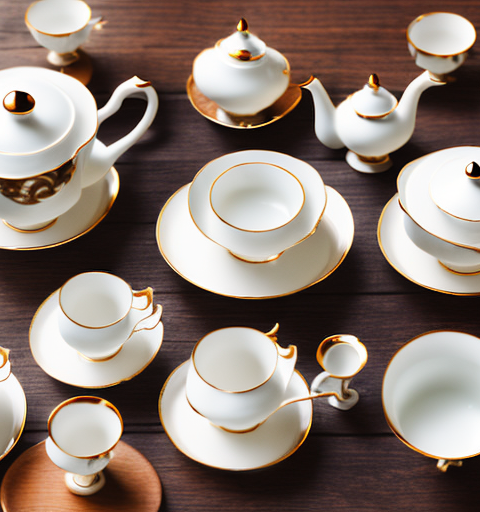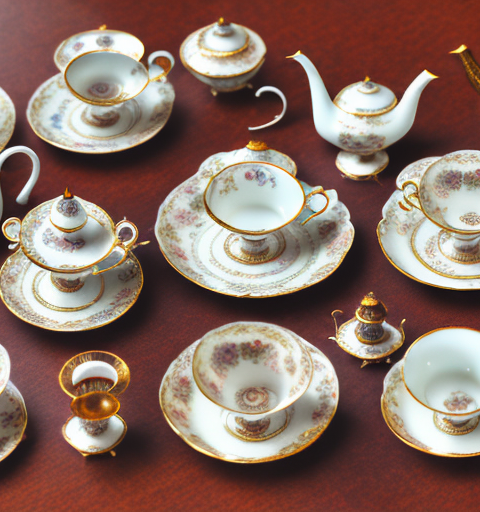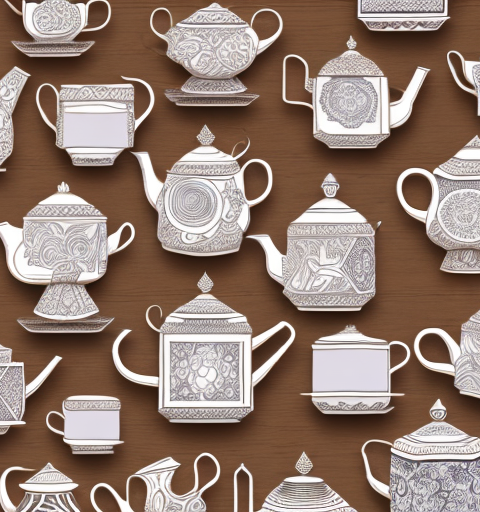Understanding the Role of Ceramic Teapots in Tea Brewing
Ceramic teapots have long been favored by tea enthusiasts for their ability to enhance the overall tea brewing experience. The porous nature of ceramic allows for better heat retention and distribution during the brewing process. This ensures that the tea leaves are evenly steeped, resulting in a more balanced and flavorful cup of tea.
Furthermore, ceramic teapots are known for their ability to maintain a steady temperature throughout the brewing process. This is particularly important when brewing tea blends with smoky flavors, as the intensity of the smokiness can be affected by temperature variations. By using a ceramic teapot, you can ensure that the desirable smoky notes are properly extracted from the tea leaves.
In addition to their functional advantages, ceramic teapots also add an aesthetic appeal to the overall tea brewing experience. With their unique designs and beautiful craftsmanship, ceramic teapots can elevate the enjoyment of savoring a cup of tea.
Exploring the Flavor Profile of Smoky Tea Blends
Smoky tea blends are known for their distinctive flavor profile, which is characterized by rich, earthy, and smoky notes. These flavors are typically achieved through a unique tea processing method called smoking, where the tea leaves are exposed to smoke from burning wood or other aromatic materials.
The smoky flavor in tea blends can vary depending on factors such as the type of wood used, the duration of smoking, and the specific tea leaves being used. Common types of smoky tea blends include Lapsang Souchong, Gunpowder, and Russian Caravan.
Smoky tea blends are beloved by many tea enthusiasts for their bold and complex flavors. When brewed properly, these teas can offer a delightful balance between smokiness and other flavor profiles, such as sweetness or floral notes.
In addition to their unique flavor profile, smoky tea blends also offer a range of potential health benefits. Like other types of tea, smoky tea blends are rich in antioxidants, which can help protect the body against free radicals and reduce the risk of chronic diseases. These teas may also have anti-inflammatory properties and can support digestion and gut health. However, it’s important to note that individual results may vary, and it’s always best to consult with a healthcare professional for personalized advice.
The Benefits of Using Ceramic Teapots for Brewing Tea
Using ceramic teapots for brewing tea offers several benefits that make them particularly suitable for smoky tea blends:
Heat Retention: Ceramic teapots excel at retaining heat, which is crucial for extracting the optimal flavor from tea leaves. This means that your smoky tea blends will stay hot for longer, allowing you to fully appreciate their complex flavors.
Even Heat Distribution: The porous nature of ceramic helps distribute heat evenly, ensuring that the tea leaves are steeped uniformly. This promotes consistent flavor extraction and prevents overbrewing or underbrewing, which can negatively impact the flavor of your tea.
Neutral Material: Ceramic is a neutral material, meaning it does not impart any unwanted flavors into the tea. This is particularly important when brewing smoky tea blends, as you want to preserve the purity of their distinct taste without any external influences.
Visual Appeal: Ceramic teapots come in a wide range of designs, colors, and patterns, allowing you to choose one that suits your personal preferences and adds a touch of elegance to your tea brewing experience.
Durability: Ceramic teapots are known for their durability, making them a long-lasting investment for tea enthusiasts. Unlike glass or porcelain teapots, ceramic teapots are less prone to breakage or chipping, ensuring that you can enjoy brewing tea with them for years to come.
Choosing the Right Ceramic Teapot for Smoky Tea Blends
When selecting a ceramic teapot for brewing smoky tea blends, there are a few key factors to consider:
Size and Capacity: Choose a teapot that can accommodate the desired amount of tea you intend to brew. Smaller teapots are ideal for individual servings, while larger ones are suitable for hosting tea gatherings.
Material Quality: Opt for a high-quality ceramic teapot that is durable and resistant to cracks or chips. Look for teapots that are made from lead-free materials to ensure the safety of your tea brewing process.
Shape and Design: Consider the shape and design of the teapot, as it can affect the heat retention and pouring capabilities. Teapots with wider bottoms tend to distribute heat more effectively, while those with longer spouts provide precise pouring.
Personal Taste: Ultimately, choose a teapot that resonates with your personal style and preferences. Whether you prefer a traditional or modern design, the teapot should bring you joy each time you brew smoky tea blends.
Price Range: Another important factor to consider when choosing a ceramic teapot for smoky tea blends is the price range. Set a budget and explore teapots within that range to ensure you find one that meets your needs without breaking the bank.
Step-by-Step Guide to Brewing Smoky Flavored Tea in a Ceramic Teapot
Follow these step-by-step instructions to brew smoky flavored tea in a ceramic teapot:
1. Preheat the teapot: Fill the ceramic teapot with hot water and let it sit for a few minutes. This helps to warm up the teapot and ensure a consistent brewing temperature.
2. Measure the tea leaves: Use a tea scale or teaspoon to measure the desired amount of smoky tea leaves. The recommended ratio is approximately 2 grams of tea leaves per 8 ounces of water, but you can adjust according to your taste preferences.
3. Add hot water: Boil water to the appropriate temperature for the type of smoky tea blend you are using. Pour the hot water over the tea leaves in the ceramic teapot, ensuring they are fully submerged. Replace the teapot lid to retain heat during the steeping process.
4. Steep the tea: Allow the tea leaves to steep in the hot water for the recommended time, usually around 2-5 minutes, depending on the specific tea blend and your desired strength. Avoid oversteeping, as it can lead to bitterness in the tea.
5. Pour and enjoy: After the desired steeping time, slowly pour the brewed smoky tea into teacups using the spout of the ceramic teapot. Take a moment to appreciate the rich aroma and flavors before sipping and savoring the delightful smokiness.
6. Clean and care for your ceramic teapot: After enjoying your smoky flavored tea, it is important to properly clean and care for your ceramic teapot. Rinse the teapot with warm water to remove any remaining tea leaves or residue. Avoid using harsh detergents or scrubbing brushes, as they can damage the delicate surface of the teapot. Instead, gently wipe the teapot with a soft cloth or sponge. Allow the teapot to air dry completely before storing it in a cool, dry place. Regularly inspect the teapot for any cracks or chips, as these can affect the brewing process and potentially lead to leaks. Taking proper care of your ceramic teapot will ensure its longevity and continued enjoyment of your favorite smoky teas.
Tips and Tricks for Enhancing the Smoky Flavor in Your Tea Blend
If you want to further enhance the smoky flavors in your tea blend, consider these tips:
Experiment with water temperature: The temperature at which you brew your smoky tea can impact its flavor intensity. Try using slightly hotter water to intensify the smoky notes, or reduce the temperature for a milder flavor.
Adjust steeping time: Steeping your smoky tea for a longer time can increase the smoky flavor. However, be cautious not to oversteep as it may result in bitterness. Similarly, reducing the steeping time can yield a lighter smoky taste.
Pair with complementary flavors: Smoky tea blends can be wonderfully complemented by certain foods or desserts. Consider pairing them with smoked salmon, dark chocolate, or grilled meats for a delightful culinary experience.
Experiment with tea ratios: Adjusting the ratio of tea leaves to water can significantly impact the strength of smoky flavors. Play around with different ratios until you discover your preferred balance of smokiness in your brew.
Use a smoky tea blend: To enhance the smoky flavor in your tea, start with a high-quality smoky tea blend. Look for teas that are specifically labeled as smoky or have a strong smoky aroma. These blends are often made with tea leaves that have been smoked over wood fires, resulting in a robust and distinct smoky flavor.
Understanding the Impact of Ceramic Material on Tea Infusion and Flavor Extraction
The choice of teapot material can have an impact on the infusion and flavor extraction process during tea brewing. Ceramic teapots, with their excellent heat retention and distribution, provide an ideal environment for the tea leaves to release their flavors into the water.
The porous nature of ceramic allows the tea leaves to expand and unfurl, maximizing their contact with the water. This promotes efficient flavor extraction, ensuring that the smoky notes of the tea blend are fully expressed in the final cup.
Furthermore, the neutral nature of ceramic prevents any interference with the natural flavors of the tea. Unlike certain materials that can impart a metallic or plastic taste, ceramic allows the smoky flavors of the tea to shine through without any undesirable influences.
In addition to its impact on flavor extraction, the ceramic material also plays a role in temperature control during tea brewing. Ceramic teapots have the ability to retain heat, keeping the water at an optimal temperature for steeping. This ensures that the tea leaves are steeped at the right temperature, allowing for a balanced and flavorful infusion.
Exploring Different Types of Smoky Tea Blends and Their Brewing Techniques
There are various types of smoky tea blends available, each with its own distinct characteristics and brewing techniques:
Lapsang Souchong: This Chinese black tea is renowned for its intensely smoky flavor. Brew it using boiling water and steep for approximately 3-5 minutes to fully extract its bold and robust character.
Gunpowder: A popular green tea variety from China, Gunpowder tea exhibits a subtle smoky taste. Brew it using water heated to around 175°F (79°C) and steep for 2-3 minutes to highlight its delicate flavors.
Russian Caravan: This blend typically combines several black teas to achieve a well-rounded smoky profile. Use boiling water and steep for 3-5 minutes to capture its complex layers of smokiness.
These are just a few examples of smoky tea blends, and each may have its own specific brewing recommendations. Be sure to refer to the tea packaging or consult with tea experts for the best brewing techniques.
Keemun: Keemun tea, also known as Qimen tea, is a Chinese black tea that offers a smoky and fruity flavor profile. To brew Keemun tea, use water heated to around 195°F (90°C) and steep for 3-4 minutes. This brewing method will bring out the tea’s rich smokiness and enhance its fruity undertones.
How to Properly Clean and Maintain Your Ceramic Teapot for Optimal Flavor
To maintain the optimal flavor and lifespan of your ceramic teapot, follow these cleaning and maintenance tips:
Handwash Only: Ceramic teapots should be hand washed with warm water and mild soap. Avoid using abrasive sponges or cleaning agents, as they can damage the glaze or lead to scratches.
Remove Tea Stains: If your ceramic teapot develops tea stains over time, you can remove them by soaking the teapot in a solution of equal parts water and vinegar for a few hours. Rinse thoroughly afterwards.
Avoid Sudden Temperature Changes: Ceramic teapots are sensitive to extreme temperature changes. Avoid exposing them to rapid shifts in temperature, such as transferring directly from a hot stovetop to cold water, as it can cause cracks.
Store Properly: When not in use, make sure to store your ceramic teapot in a dry and dust-free environment. If possible, keep it in a protective cloth or box to prevent accidental damage.
Regularly Check for Cracks: Inspect your ceramic teapot for any cracks or chips. If you notice any damage, it is advisable to replace the teapot, as it can impact the brewing process and affect the flavor of your tea.
Expert Recommendations on Pairing Smoky Flavored Teas with Food and Desserts
Pairing smoky flavored teas with the right foods and desserts can elevate the taste experience. Here are some expert recommendations:
Protein-Rich Foods: Smoky tea blends, with their robust flavors, complement well with protein-rich foods such as grilled meats, smoked fish, or hearty stews. The smokiness of the tea enhances the savory elements of the dishes.
Dark Chocolate: The intensity of smoky tea blends pairs beautifully with the richness of dark chocolate. Enjoy a few squares of dark chocolate alongside your tea to indulge in a harmonious blend of flavors.
Cheese: Experiment with different types of cheeses to find delightful pairings with smoky flavored teas. Consider trying smoked Gouda, cheddar, or blue cheese to create a balanced taste experience.
Sweet and Spicy Foods: Smoky tea blends can provide a contrast to sweet or spicy dishes. Try pairing them with dishes that have elements of sweetness or spiciness, such as honey-glazed carrots or spicy Thai curries.
These are just a few suggestions, and the best food and tea pairings can vary based on personal taste preferences. Do not hesitate to explore and experiment with different combinations to find your perfect match.
Exploring the Cultural Significance of Smoky Tea Blends and Their Traditional Brewing Methods
Smoky tea blends hold cultural significance in various regions around the world, each with its own unique brewing methods and traditions:
China: The traditional Chinese smoky tea known as Lapsang Souchong dates back to the Qing dynasty. It is produced by exposing the tea leaves to smoke from pinewood, resulting in a distinctive smoky flavor. Chinese tea ceremonies often incorporate smoky tea blends, symbolizing the deep-rooted respect for tradition.
Russia: Russian Caravan tea, a popular smoky tea blend, has deep historical roots. It is said to have originated from the trade route between China and Russia, where teas were transported in caravans overland. The tea leaves would absorb the smoky aroma from campfires along the way, giving rise to its unique flavor profile.
Morocco: In Moroccan culture, smoky tea blends such as Gunpowder tea are commonly enjoyed in a traditional tea ceremony known as “Atai.” The tea is steeped multiple times and poured from great heights into small glasses, creating a frothy and refreshing brew.
The cultural significance of smoky tea blends enriches the tea-drinking experience, offering a glimpse into the history and heritage of different regions.
A Comparison of Ceramic vs. Other Materials for Brewing Tea with Smoky Flavors
When it comes to brewing smoky tea blends, ceramic teapots offer distinct advantages compared to other materials:
Glass: While glass teapots allow for visual appreciation of the tea’s color and movement, they lack the heat retention properties of ceramic. This can lead to quicker temperature drops and potentially compromise the extraction of smoky flavors.
Cast Iron: Cast iron teapots are renowned for their excellent heat retention, but they may also impart metallic undertones to the tea. This can interfere with the purity of the smoky flavor in tea blends.
Porcelain: Porcelain teapots provide a similar heat retention ability as ceramic but may not be as porous. This can affect the flavor extraction process, resulting in a less robust smoky taste.
While other materials have their own merits, ceramic teapots remain an excellent choice for brewing smoky tea blends due






